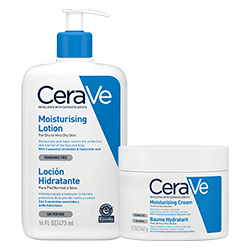What is eczema?
Eczema is a non-contagious skin condition that causes red and inflamed skin that can itch and bleed if scratched. Eczema causes include a variety of factors, including genetics, an over reactive immune system, environmental conditions and harsh chemicals,1and it is often associated with a compromised skin barrier2 that allows moisture to evaporate from the skin and leaves skin vulnerable to irritants. In addition to these causes of eczema, specific triggers can cause eczema flare-ups as well. Among the most common are rough fabrics like wool, soaps and detergents, animal dander.3 Avoiding these triggers and knowing how to manage the signs of eczema by keeping skin hydrated and relieving the itchy sensation are key for helping to minimize and manage outbreaks.4
What does eczema look like?
If you’re not sure if you have eczema symptoms or signs of another skin condition, you may have looked for eczema pictures on the internet. It’s important to keep in mind that signs of eczema can range from mild to severe. Mild eczema can appear as dry, flaky skin, while more severe eczema symptoms can include extreme redness and irritation along with cracking and oozing. Persistent itching is another sign of eczema. The ideal way to be sure if you’re experiencing eczema is to see a dermatologist who can properly diagnose the cause of your skin symptoms.
Types of eczema
Eczema is actually a group of skin conditions that cause redness, itching and inflammation of the skin. In addition to the most common form of eczema (atopic dermatitis), the National Eczema Association explains there are several other forms.1
Contact dermatitis: Unlike atopic dermatitis, contact dermatitis results when the skin comes in contact with a specific irritant and results in redness, itching and burning. Common causes of contact dermatitis include chemicals, detergents, perfumes, paints, bleach, wool, skincare products that contain alcohol, soaps, fragrances and allergens such as pollen or animal dander.1,5
Seborrheic dermatitis: Common in areas with a high concentration of oil glands (such as the upper back, nose and scalp), this type of eczema is not caused by allergic reaction and it is believed microorganisms such as yeast play a role. Seborrheic dermatitis is the cause of cradle cap in babies and dandruff in adults; symptoms can range from flakes to greasy scales and redness.6
Dyshidrotic eczema: Small, itchy blisters that appear on the edges of the fingers, toes, palms and soles of the feet are likely dyshidrotic eczema, which can be accompanied by flaking, cracking and pain as well. Stress and allergies are common triggers.7
Nummular eczema: This eczema can occur at any age, but its itchy, coin-shaped spots look different than other types. It is believed these eczema symptoms are caused by insect bites or dry skin.8
Stasis dermatitis: Also called gravitational dermatitis and venous eczema, this skin condition is associated with circulation problems that lead to swelling and fluid accumulation in the lower legs. In addition to fluid leaking out of the veins into the skin, this type of eczema also causes redness, itching, scaling and pain.10
- Ruzicka, B. Przybilla, J. Ring (2006) Handbook of Atopic Eczema; 2ndedition; Springer
- Proksch, Ehrhardt et al., Journal of Dermatological Science, Volume 43 , Issue 3 , 159-169
- http://weishendopublications.com/uploads/3/4/4/9/34499679/eczema.pdf
- Sidbury R, Tom WL,et al. “Part 4: Guidelines of care for the management of atopic dermatitis. Part 4: Prevention of disease flares and use of adjunctive therapies and approaches.”J Am Acad Dermatol. 2014 Jul;71(1);1218-33.
- https://nationaleczema.org/eczema/types-of-eczema/contact-dermatitis/
- https://nationaleczema.org/eczema/types-of-eczema/seborrheic-dermatitis/
- https://nationaleczema.org/eczema/types-of-eczema/dyshidrotic-eczema/
- https://nationaleczema.org/eczema/types-of-eczema/nummular-eczema/
- https://nationaleczema.org/eczema/types-of-eczema/stasis-dermatitis/
Remarks: This general information is not intended to diagnose any medical condition or to replace your healthcare professional. In cause of any doubt about your skin condition or cosmetic and/or skincare products, consult medical doctors and/or dermatologist advice prior use.


